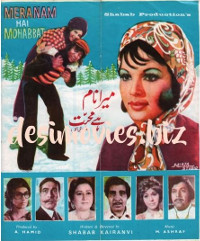Mera Naam Hai Mohabbat
Mera Naam Hai Mohabbat
Mera Naam Hai Mohabbat is a phrase in Urdu language that translates to "My name is Love" in English. It is a common expression used in poetry, literature, and everyday conversations in South Asian cultures.
Origins[edit | edit source]
The phrase "Mera Naam Hai Mohabbat" has its roots in the rich tradition of Urdu poetry and literature. Urdu, a language known for its poetic beauty and depth of emotion, often uses such expressions to convey feelings of love, passion, and romance.
Usage[edit | edit source]
"Mera Naam Hai Mohabbat" is often used as a declaration of love or as a poetic expression of deep affection. It can be found in romantic poetry, songs, and films, where it is used to evoke feelings of love and longing.
Cultural Significance[edit | edit source]
In South Asian cultures, love holds a special place in people's hearts, and expressions like "Mera Naam Hai Mohabbat" are cherished for their ability to capture the essence of love and romance. The phrase has become a symbol of love and passion in Urdu-speaking communities around the world.
In Popular Culture[edit | edit source]
The phrase "Mera Naam Hai Mohabbat" has been featured in various songs, movies, and literary works, where it is used to convey themes of love, devotion, and emotional connection. Its popularity has made it a timeless expression of love in South Asian pop culture.
See Also[edit | edit source]
Navigation: Wellness - Encyclopedia - Health topics - Disease Index - Drugs - World Directory - Gray's Anatomy - Keto diet - Recipes
Search WikiMD
Ad.Tired of being Overweight? Try W8MD's physician weight loss program.
Semaglutide (Ozempic / Wegovy and Tirzepatide (Mounjaro / Zepbound) available.
Advertise on WikiMD
WikiMD is not a substitute for professional medical advice. See full disclaimer.
Credits:Most images are courtesy of Wikimedia commons, and templates Wikipedia, licensed under CC BY SA or similar.Contributors: Prab R. Tumpati, MD

